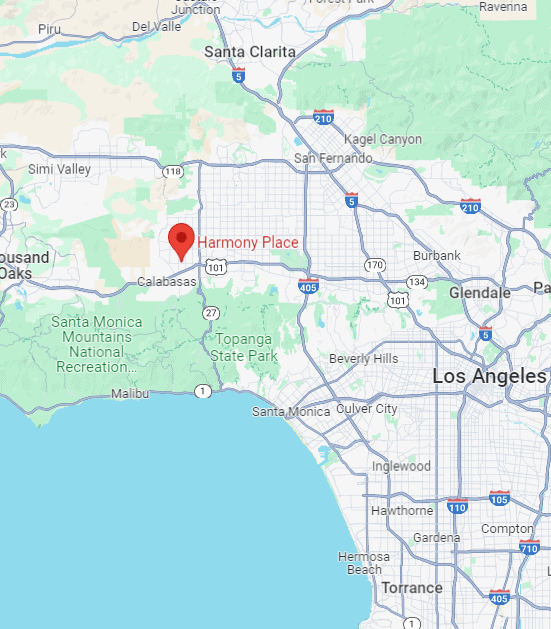Dual Diagnosis Treatment for PTSD and Addiction in Los Angeles, California
PTSD and Addiction Treatment in Woodland Hills, Southern California
At Harmony Place Addiction Recovery Center, we provide specialized concurrent treatment for PTSD and substance abuse at our three Los Angeles facilities. We understand that healing from post-traumatic stress disorder and addiction requires addressing both conditions simultaneously for lasting recovery. Whether you’re navigating complex PTSD, drug addiction, or alcoholism, our comprehensive approach ensures that you receive the support and care you need. We are committed to guiding you through the recovery process with a full continuum of care, offering individualized attention every step of the way. If you’re seeking PTSD treatment in Los Angeles or broader trauma recovery in Southern California, Harmony Place is here to help you find hope and stability.
Our treatment programs include a wide range of options, all tailored to meet your specific needs. From individual counseling to PTSD group therapy, cognitive behavioral therapy (CBT), and other evidence-based methods, we focus on creating an environment where true healing can begin. Recognized among leading PTSD treatment centers in California, Harmony Place also offers trauma therapy in Woodland Hills and access to PTSD treatment across our facilities. Whether you need inpatient PTSD treatment for intensive care or outpatient trauma therapy in Los Angeles, our team will craft a plan designed to address your unique experiences and challenges.
To ensure our services are accessible to you, Harmony Place Addiction Recovery accepts health insurance and offers assistance in verifying your coverage. From PTSD inpatient treatment programs to dual-diagnosis trauma care, we are committed to creating a path to recovery that works for you. If you’re ready to take the first step toward overcoming PTSD and reclaiming your life, reach out today to learn more about how we can help. Contact us to explore your options for inpatient or outpatient care and start your recovery with the compassionate support you deserve.
What Is Post Traumatic Stress Disorder (PTSD)?
PTSD (post-traumatic stress disorder) is a mental health condition that potentially develops after a person experiences or witnesses a traumatic event.
Causes of PTSD
Although there is no single cause of PTSD, several types of trauma can lead to its occurrence, including:
- Experiencing combat or violence
- Being caught in a natural disaster, like a hurricane, tornado, flood, or fire
- Facing violent personal assaults or crimes such as mugging, rape, torture, or kidnapping
- Suffering from accidents like car crashes, plane crashes, and train wrecks
- Childhood abuse or neglect, including physical, sexual, and emotional abuse
- Experiencing a major injury
- Witnessing violence or harm fall another person
PTSD Statistics
It’s estimated that around 3.6% of U.S. adults aged 18 and older (9.2 million people) have PTSD in a given year.
Women are more likely than men to experience PTSD, with 10% of women developing the disorder compared to 5% of men.

What Is Dual Diagnosis or Co-Occurring Disorder?
Dual-diagnosis disorder is when someone has a mental health disorder and substance use disorder (SUD) simultaneously. This can occur when someone is coping with a trauma, such as emotional trauma or post-traumatic stress disorder (PTSD) and turns to drugs or alcohol as a way to manage their pain. Dual diagnosis requires specialized treatment to manage both conditions simultaneously.
In drug rehabilitation, concurrent treatment for PTSD and substance abuse is essential for lasting recovery. By treating both issues together, you can better comprehend the relationship between your mental health and substance use, leading to more effective healing. Dual diagnosis programs focus on comprehensive care, combining therapy and addiction treatment to provide the tools needed for long-term healing and sobriety.
What Is Concurrent PTSD and Substance Abuse Treatment?
Concurrent PTSD and substance abuse treatment treat each condition simultaneously, acknowledging that you may use substances to cope with PTSD. This integrated approach is important for trauma recovery, providing total care that tackles the emotional impact of PTSD and addiction together, supporting you in your healing journey. Through trauma-informed care, you receive the support you need.
At Harmony Place Treatment Center, our substance abuse treatment and trauma-informed care programs include assisted detoxification, followed by complete substance abuse therapy created for your individual needs as you battle PTSD.
Statistics on PTSD and Substance Abuse in Los Angeles County
In California, 1,797 substance abuse treatment facilities served 96,960 patients, the 2019 N-SSATS report highlighted. Of these facilities, 58.5% treated clients with both mental health and substance use disorders (SUDs). Among those enrolled, 36.6% had experienced sexual abuse, 35.1% had faced intimate partner or domestic violence, and 52.9% had encountered trauma.
PTSD affects about 3.6% of the U.S. adult population, or roughly 9 million people, with 37% experiencing severe symptoms. Women are more likely to develop PTSD than men. Mental health issues among veterans, especially those with military service histories, incur substantial costs. They are estimated at $4 billion to $6.2 billion over two years for treatment of major depression and PTSD alone. Studies show that a substantial amount of veterans with PTSD also suffer from SUDs.
What Is Los Angeles County Known For?
Los Angeles County is known for its cities, such as Los Angeles, Beverly Hills, Long Beach, Pasadena, and Santa Monica, which offer culture, entertainment, and iconic landmarks. The area is home to world-famous attractions such as the Hollywood Walk of Fame, Getty Center, Griffith Observatory, Santa Monica Pier, and Universal Studios Hollywood, making it a top destination for tourists worldwide.
With its diverse neighborhoods, sunny beaches, and rich entertainment history, Los Angeles County also boasts a thriving arts and dining scene. Whether exploring the luxurious streets of Beverly Hills or appreciating the coastal magnificence of Santa Monica, the county provides endless experiences, blending urban excitement with natural beauty.

We Will Check Your Insurance
Treating PTSD and Substance Addiction in Los Angeles, CA
If you’re like many people, it may not surprise you that there is a connection between PTSD and addiction. It’s not always clear how one condition can lead to another, but sometimes, it’s pretty evident.
If you’re struggling with either condition, it’s essential to seek treatment. Our PTSD treatment in Los Angeles, California, can help you or your loved one recover.

Inpatient PTSD and Addiction Treatment
For individuals grappling with the dual diagnosis of PTSD and addiction, inpatient treatment provides a safe and structured environment focused on comprehensive healing. At Harmony Place in Woodland Hills, CA, this treatment approach is tailored to meet the unique challenges posed by trauma and substance abuse. PTSD often contributes to the development of addiction as a way to self-medicate the emotional pain and distress stemming from past experiences. Conversely, substance dependency can exacerbate PTSD symptoms, creating a cycle of trauma and addiction that is difficult to break. Harmony Place’s inpatient program offers 24/7 care with evidence-based therapies, such as trauma-focused cognitive behavioral therapy and EMDR, allowing clients to process their trauma in a supportive space free from external distractions.
Harmony Place prioritizes addressing both PTSD and addiction simultaneously, acknowledging the complex interplay between mental health and substance use disorders. Clients struggling with alcohol addiction benefit from a combination of supervised detox, individualized therapy, and emotional support tailored to rebuild trust and resilience. Similarly, clients coping with drug addiction receive comprehensive treatment plans that include medical care, coping strategies, and relapse prevention. Located in the serene neighborhood of Woodland Hills within Los Angeles, Harmony Place fosters a tranquil environment where individuals can fully focus on their recovery. With its expert team and holistic care approach, Harmony Place empowers clients to regain control of their lives and move toward lasting wellness.
Outpatient PTSD and Addiction Treatment
Outpatient PTSD and addiction treatment offers a flexible yet effective approach for those addressing the interconnected challenges of trauma and substance use disorders. At Harmony Place in Woodland Hills, CA, outpatient programs are designed to help individuals manage the dual diagnosis of PTSD and addiction without disrupting their daily responsibilities. PTSD can leave individuals feeling trapped by recurring memories, anxiety, and emotional numbness, often leading to substance use as a coping mechanism. Outpatient care allows clients to unpack and address these underlying issues through trauma-focused therapy and addiction treatment strategies while maintaining their work, family, or educational commitments. This model prioritizes healing while empowering clients to stay connected with their community.
At Harmony Place, outpatient programs are tailored to meet the specific needs of those overcoming PTSD and addiction. For clients battling alcohol dependency, the focus is on breaking the cycle of self-medication through counseling, group therapy, and education on healthy coping techniques. For those dealing with drug addiction, the program incorporates relapse prevention, emotional regulation strategies, and trauma processing to restore emotional balance and reduce the risk of substance use. Conveniently located in Woodland Hills, a serene neighborhood within Los Angeles, Harmony Place provides a supportive and accessible environment for recovery. With a compassionate team and a holistic approach, the outpatient programs at Harmony Place help clients take meaningful steps towards reclaiming their lives and achieving mental and physical stability.

Dual Diagnosis Treatment Center Near Me for PTSD and Substance Abuse Rehab in Los Angeles, CA
At Harmony Place in Woodland Hills, CA, we specialize in concurrent treatment for PTSD and substance abuse, offering a complete approach to trauma recovery. Our team provides trauma-informed care, detoxification, and substance abuse therapy to help you heal from both conditions.
Call us at (855) 652-9048 or visit us in person at 23041 Hatteras St, Woodland Hills, CA 91367, to learn more about our treatment options for concurrent PTSD and addiction rehab in the Los Angeles area.
Outpatient PTSD and Addiction Rehab Facility Near Me
If you’re looking for an outpatient PTSD and addiction rehab facility “near me,” Valley Restoration Center in Woodland Hills offers a compassionate and effective solution for those seeking recovery. Conveniently located at 22900 Ventura Blvd, Ste 314, Woodland Hills, CA 91364, the REHAB center specializes in helping individuals overcome the dual challenges of trauma and substance dependency. PTSD can often lead to self-medicating behaviors, such as alcohol or drug use, while ongoing substance abuse can worsen symptoms of trauma. At Valley Restoration Center, outpatient programs focus on addressing these challenges simultaneously, empowering clients to heal while maintaining their daily responsibilities. Our evidence-based therapies provide a foundation for emotional stability and better coping strategies, all within a supportive community.
Valley Restoration Center’s outpatient treatment programs offer a flexible approach for clients navigating both PTSD and substance abuse issues. With therapy options that include individual counseling, group support, and relapse prevention education, the programs are designed to uncover the root causes of trauma and addiction and address them in a structured yet adaptable way. Whether you’re dealing with alcohol dependency or drug addiction, the team at Valley Restoration Center will work closely with you to develop a customized recovery plan that suits your needs. By seeking outpatient care, clients have the opportunity to apply the skills and strategies learned in treatment to their everyday lives, fostering sustainable progress.
Getting to Valley Restoration Center is simple and convenient for those living in Woodland Hills and the surrounding Los Angeles area. Located along Ventura Blvd, the center is easily accessible via major roads, including the Ventura Freeway (US-101). For those traveling by public transport, local bus routes stop just a short walk away from the facility. The serene and welcoming environment at Valley Restoration Center provides a safe space where individuals can begin their recovery journeys. With its focus on combining accessibility with expert care, Valley Restoration Center is the go-to outpatient facility “near me” for those looking to take meaningful steps toward healing from PTSD and addiction.
Inpatient PTSD and Addiction Rehab Facility Near Me
If you’re searching for an inpatient PTSD and addiction rehab facility “near me,” Harmony Place in Woodland Hills offers personalized, 24/7 care designed to support clients facing the dual challenges of trauma and substance use. With two premier residential locations—Harmony Place at 23041 Hatteras St and Harmony Place East at 22913 Burbank Blvd—these facilities focus on providing comprehensive solutions for individuals recovering from PTSD and addiction. Unresolved trauma can lead to self-medication through drugs or alcohol, worsening mental health symptoms and creating a harmful cycle. Harmony Place’s inpatient programs are tailored to address these intertwined issues, providing clients with expert care and trauma-focused therapy in a safe, structured environment.
Harmony Place’s holistic approach includes evidence-based treatments such as trauma-focused cognitive behavioral therapy, EMDR, and pharmacological support when necessary. Clients struggling with PTSD and alcohol dependence benefit from supervised detox, individualized therapy, and life skills training to rebuild resilience and restore emotional stability. For those facing PTSD and drug addiction, the treatment combines medical care, coping strategies, and relapse prevention to empower individuals on the path to long-term healing. With a focus on dual-diagnosis care, Harmony Place ensures clients receive the personalized attention they need to break free from addiction while addressing the root causes of their trauma.
Located in the serene Woodland Hills neighborhood, these facilities are conveniently accessible for residents in Los Angeles and nearby communities. Harmony Place at Hatteras St and Harmony Place East on Burbank Blvd are both minutes from Ventura Blvd and the Ventura Freeway (US-101), ensuring easy access whether you’re traveling by car or public transportation. The peaceful surroundings of Woodland Hills offer the perfect backdrop for recovery, fostering a sense of calm and privacy throughout the healing process. If you’re seeking top-quality inpatient PTSD and addiction treatment “near me,” Harmony Place provides a trusted and compassionate partner every step of the way.
Call Us 24/7
What Are the Risks of Having a Substance Addiction and PTSD at the Same Time?
The risks of substance addiction and PTSD are severe and multifaceted, including a heightened risk of overdose due to overwhelming substance use. Additionally, the interplay between substance abuse and PTSD often worsens mental health issues like depression and anxiety, complicating the management of both conditions and increasing overall vulnerability.
The risk of suicide is notably higher among individuals struggling with both PTSD and substance abuse. The overwhelming emotional distress and impaired judgment associated with these conditions can lead to suicidal thoughts or actions. Severe physical health decline is also a concern, as prolonged substance misuse can damage vital organs and systems, compounding the effects of PTSD-related stress.
Strained relationships and social isolation frequently result from the dual burden of substance abuse and PTSD. The negative impact on interpersonal connections can lead to further emotional distress and difficulties maintaining employment. Impaired cognitive function, including memory and decision-making, often accompanies these conditions, further complicating daily life.
Legal and financial problems are common, as substance abuse can lead to risky behaviors and legal issues. In contrast, financial instability often results from the costs associated with addiction and the inability to maintain steady employment. Additionally, aggressive or risky behavior may emerge, fueled by the combination of substance use and unresolved PTSD triggers, such as nightmares and PTSD-related anxiety. Addressing these risks through comprehensive treatment is essential for managing both substance abuse and PTSD effectively.
Signs and Symptoms of a PTSD and Substance Abuse Co-Occurring Disorder
Identifying the symptoms and signs of PTSD, as well as substance abuse, is crucial for effective treatment. Both conditions often present with overlapping symptoms, making it essential to identify them early. Understanding these signs helps in seeking timely intervention and accessing the appropriate care for both PTSD and substance use disorders (SUDs).
Common Signs and Symptoms of Post-Traumatic Stress Disorder (PTSD)
Common symptoms of post-traumatic stress disorder (PTSD) can significantly impact a person’s daily life. Intrusive thoughts, such as flashbacks and nightmares, are often distressing and disruptive, making it difficult for you to distinguish between past and present experiences. These PTSD symptoms can lead to heightened anxiety and emotional distress.
Avoidance of reminders of trauma is another hallmark of PTSD. You may go to great lengths to avoid situations, locations, or people that remind you of the traumatic event. This avoidance can exacerbate negative changes in mood and cognition, contributing to feelings of depression, guilt, and shame.
Hyperarousal is characterized by being easily startled, tense, or experiencing heightened emotional responses. Emotional numbness and memory problems related to the trauma further complicate daily functioning. Veterans and PTSD patients may struggle with these symptoms due to past experiences and trauma triggers.
Self-destructive behavior and increased anxiety are also expected, often exacerbating the overall impact of PTSD. Addressing these symptoms through a comprehensive PTSD diagnosis and treatment plan is essential for effective recovery and improving quality of life.

Common Signs and Symptoms of Substance Use Disorder
Signs of substance use disorder (SUD) manifest in various ways, impacting your life and health. Cravings for the substance are a primary indicator, driving you to seek out your drug of choice despite adverse consequences. Tolerance is another sign where growing amounts of the substance are needed to reach the same effect.
Withdrawal symptoms can be severe and include physical and emotional distress when not using the substance. This discomfort can make it challenging for you to quit, even if you want to. Neglecting responsibilities at work, home, or in personal relationships becomes evident as substance use takes priority over other aspects of life.
Loss of control over substance use is a significant issue, often marked by continued use despite clear negative consequences, such as health problems, legal issues, or financial difficulties. Social isolation and risky behavior further highlight the disorder, as you may withdraw from loved ones or engage in dangerous activities while using.
Physical health issues and mood swings are common as substance misuse impacts both the body and mind. Addressing these symptoms through addiction counseling and alcohol detox is crucial for effective recovery. Substance abuse prevention strategies can also play a vital role in supporting long-term sobriety and improving overall well-being.
Can Drug or Alcohol Addiction Cause You to Have PTSD?
Yes, drug or alcohol addiction can cause PTSD, especially when substance abuse leads to traumatic experiences like accidents or violence. Alcohol abuse, opioid addiction, and substance dependence can trigger or worsen PTSD symptoms, creating a harmful cycle of trauma and addiction that requires specialized, concurrent treatment for recovery.
At Harmony Place Drug and Alcohol Treatment, we understand the intricate connection between addiction and trauma. Our programs offer integrated treatment for both conditions. This ensures that if you have a PTSD diagnosis and substance dependence, you receive the care you need to heal from both. Addressing both issues concurrently is critical to lasting recovery and mental health stabilization. Reach out to our team to get all your questions answered, such as “Can addiction cause PTSD?”
Can PTSD Lead to Substance Abuse and Addiction?
Yes, PTSD can lead to substance abuse, as you may turn to alcohol or drugs to cope with PTSD triggers and emotional distress. The effects of alcohol abuse or drug use may provide temporary relief. Still, over time, it worsens both the addiction and PTSD symptoms, creating a harmful cycle of dependence and trauma.
Concurrent treatment for substance use and PTSD is essential for lasting recovery. PTSD treatment often includes addiction counseling, where you learn healthier ways to manage your trauma. By addressing both issues simultaneously, you can recover from the causes of your substance abuse and PTSD, breaking free from the cycle of addiction and trauma.
Can PTSD Cause Addiction and Substance Abuse?
PTSD and addiction are often comorbid, meaning they occur simultaneously. In fact, it’s estimated that as many as 1 in 3 people with PTSD also struggle with addiction.
There are a few reasons why PTSD and addiction tend to go hand-in-hand. People who have PTSD may use drugs or alcohol to:
- Numb themselves to the pain they’re feeling
- Escape from uncomfortable memories and flashbacks
- Find relief from insomnia and other sleep problems
- Manage anxiety and depression
- Cope with aggressive impulses
If you have PTSD, it’s vital to seek out treatment from a qualified PTSD treatment center. If you’re also struggling with addiction, there are specialized programs that can help you address both conditions simultaneously.
During our PTSD treatment in Los Angeles, you can heal the wounds of your past and build a bright future.
Request a 100% Confidential Callback
Does Health Insurance Cover Dual Diagnosis for Addiction and PTSD Treatment in Los Angeles, CA?
Yes, health insurance in Los Angeles, CA often covers addiction and PTSD treatment. This typically includes coverage for PTSD therapy, PTSD support groups, PTSD medication, and addiction support groups. However, the degree of coverage varies based on the plan and provider. Some plans offer comprehensive coverage, while others may have limitations or require out-of-pocket expenses for certain services.
It is important to review your insurance plan details to ensure you understand your benefits and obtain the full support required for recovery. At Harmony Place Rehab Center, we can help you navigate your insurance coverage and identify your treatment options. Call us at (855) 652-9048 to verify your coverage for dual-diagnosis treatment and start your path to recovery.
How Much Does Dual Diagnosis Treatment Cost for Substance Abuse and PTSD in California?
The cost of concurrent substance abuse and PTSD treatment in California varies widely depending on the facility and level of care required. You can anticipate paying for services such as cognitive behavioral therapy for PTSD, relapse prevention, and comprehensive PTSD counseling. Costs may also include additional therapies for PTSD substance abuse.
It’s best to contact treatment centers directly to get a clearer picture of the costs associated with treatment, including any potential insurance coverage or financial assistance options. At Harmony Place Rehab Center, we offer detailed information on treatment costs and can assist you in understanding your financial options. Reach out to us to discuss your needs and verify coverage details.

How to Get into Rehab for PTSD and Substance Abuse Recovery
To get into rehab for PTSD and substance abuse recovery, you should start with a comprehensive evaluation by a mental health professional. This assessment determines the severity of PTSD symptoms and substance use issues, guiding recommendations for programs that offer concurrent care for both conditions, ensuring tailored and effective treatment.
Next, you should contact us at Harmony Place or call our team at (855) 652-9048 to explore available programs, such as those providing cognitive behavioral therapy for PTSD and substance abuse treatment. It’s important to verify insurance coverage and discuss financial options. Once a suitable program is identified, you can begin the admission process, which may involve pre-admission paperwork, scheduling an intake assessment, and preparing for the treatment journey.
How to Treat PTSD and Addiction
While not every treatment for PTSD and addiction will work the same for everyone, several still have been shown to be effective.
Some options for co-occurring addiction and PTSD treatment in Los Angeles include:
Inpatient Treatment
Inpatient treatment for PTSD and addiction typically lasts 28-30 days. During this time, you’ll receive 24-hour care from a team of medical professionals. During a residential stay, you can also engage in group and individual therapy sessions.
Inpatient treatment can be an effective option for people who are struggling with severe symptoms or who have relapsed in the past.
Outpatient Treatment
Typically, outpatient treatment for PTSD and addiction lasts 3-4 months. During this time, you’ll participate in group and individual therapy sessions a few times each week.
You’ll also have the opportunity to meet with a psychiatrist or other medical professional to manage any medication you may be prescribed.
Outpatient treatment can be an effective option for people struggling with milder symptoms or who have a robust support system.
Medication-Assisted Treatment (MAT)
Medication-assisted treatment (MAT) is a treatment option that combines medication with therapy and other support services.
MAT can be an effective option for people who are struggling with addiction and co-occurring mental health disorders, such as personality disorders.
Intensive Outpatient Programs
Intensive outpatient programs (IOPs) are a type of treatment that provides a step down from inpatient care. IOPs typically last 8-10 weeks.
Generally, these programs can be an effective option for people struggling with moderate symptoms or who need more support than what’s available in traditional outpatient treatment.
Partial Hospitalization Program
A partial hospitalization program (PHP) is a type of drug rehab that provides a step down from inpatient care.
Typically, PHP programs last 4-6 weeks. A partial hospitalization rehab can be an effective option for people struggling with moderate to severe symptoms.
Cognitive Behavioral Therapy
Cognitive behavioral therapy (CBT) is a standard treatment for both conditions. CBT helps people change how they think and behave.
A therapist could, for instance, help individuals with PTSD by having them reflect on their negative thoughts about themselves.
For example, a CBT therapist may help an individual with an addiction identify and change the thought patterns contributing to their addictive behaviors.
Furthermore, they can develop coping mechanisms for dealing with symptoms by teaching them how to better deal with stressful situations.
Exposure Therapy
Another approach to treating PTSD is called exposure therapy. Overall, this trauma therapy treatment involves slowly and repeatedly exposing a person to the things that cause their symptoms.
This type of therapy aims to help people learn how to cope with their triggers and eventually reduce their fear of them.
Eye Movement Desensitization and Reprocessing (EMDR)
Another form of exposure therapy, eye movement desensitization and reprocessing (EMDR), involves a person moving their eyes back and forth while thinking about or imagining their trigger.
In general, this movement is thought to help the brain process the trauma so that it’s less distressing.

Begin PTSD Treatment in Los Angeles, CA
Our staff at Harmony Place provides comprehensive treatment for addiction and PTSD. We believe in a holistic approach to addiction and PTSD treatment, which means we address addiction’s physical, mental, and emotional aspects. At Harmony Place, we offer inpatient and outpatient treatment programs, as well as PHP and IOP.
Our cognitive-behavioral therapy (CBT), dialectical behavior therapy, and motivational enhancement therapy are just a few of the many evidence-based treatments we offer. And we have experience treating co-occurring disorders like PTSD and addiction.
If you or someone you love in Woodland Hills is struggling with PTSD and addiction, please contact us to learn more about our comprehensive drug rehab in Los Angeles.
Mental Health & Addiction Treatment in Los Angeles
Harmony Place offers integrated Dual Diagnosis treatment for individuals facing addiction alongside mental health challenges. Our Los Angeles rehab programs address trauma, PTSD, depression, anxiety, bipolar disorder, and ADHD through personalized therapy and holistic care designed for lasting healing and stability.
- Inpatient Rehab Los Angeles
- Intensive Outpatient Program Los Angeles
- Evening Intensive Outpatient Program
- Medication Assisted Treatment Los Angeles
- Outpatient Rehab Program Los Angeles
- Los Angeles Partial Hospitalization Program
- Medically Assisted Detox LA
- Sober Living Homes and Halfway Houses
- Clinical Care Los Angeles
- Family Therapy Rehab Program
- Couples Rehab Los Angeles
- Men’s Addiction Rehab California
- Women’s Rehab Center SoCal
- Addiction Treatment for Veterans
- Short-Term Addiction Rehab
- Long-Term Addiction Rehab
- Private Luxury Rehab Los Angeles
- Faith-Based Rehab Programs
- Non-Faith-Based Rehab
- Rehab for Professionals LA
- Rehab Aftercare Alumni Programs
California Addiction Treatment and PTSD Statistics
- In California, 1,797 substance abuse treatment facilities, serving 96,960 clients on March 29, 2019, the 2019 N-SSATS report identified. Of these facilities, 1,052 (58.5%) provided treatment for clients with co-occurring mental health and substance abuse disorders. Additionally, 657 clients (36.6%) had experienced sexual abuse, 631 clients (35.1%) had faced intimate partner or domestic violence, and 951 clients (52.9%) had experienced trauma.
- PTSD impacts approximately 3.6% of the U.S. adult population, which equates to around 9 million people. Of those diagnosed, about 37% experience severe symptoms. Women are notably more likely to develop PTSD compared to men, according to the National Alliance on Mental Illness (NAMI).
- Treatment for major depression and PTSD among OIF and OEF veterans was estimated at $4 to $6.2 billion over two years, excluding costs for substance use and family strain, according to the National Institutes of Health.
- Among Iraq and Afghanistan veterans, 34.2% of men with a lifetime diagnosis of PTSD also had an Alcohol Use Disorder (AUD), and 17.3% had a Substance Use Disorder (SUD), according to the U.S. Department of Veterans Affairs (VA). Among women with PTSD, 20.1% had an AUD, and 10.5% had a SUD, according to the US Department of Veterans Affairs.
- Approximately 49% of rape victims will develop PTSD, while nearly 32% of those subjected to severe physical assault are affected. Serious accidents, such as car or train crashes, result in PTSD for 16.8% of individuals, and 15.4% of shooting and stabbing victims develop the disorder. The sudden death of a close loved one leads to PTSD in 14.3% of cases, and 10.4% of parents with children facing life-threatening illnesses experience PTSD. Witnessing the murder or severe injury of someone else causes PTSD in 7.3% of people, and 3.8% of those affected by natural disasters develop PTSD, according to the PTSD Institute.










